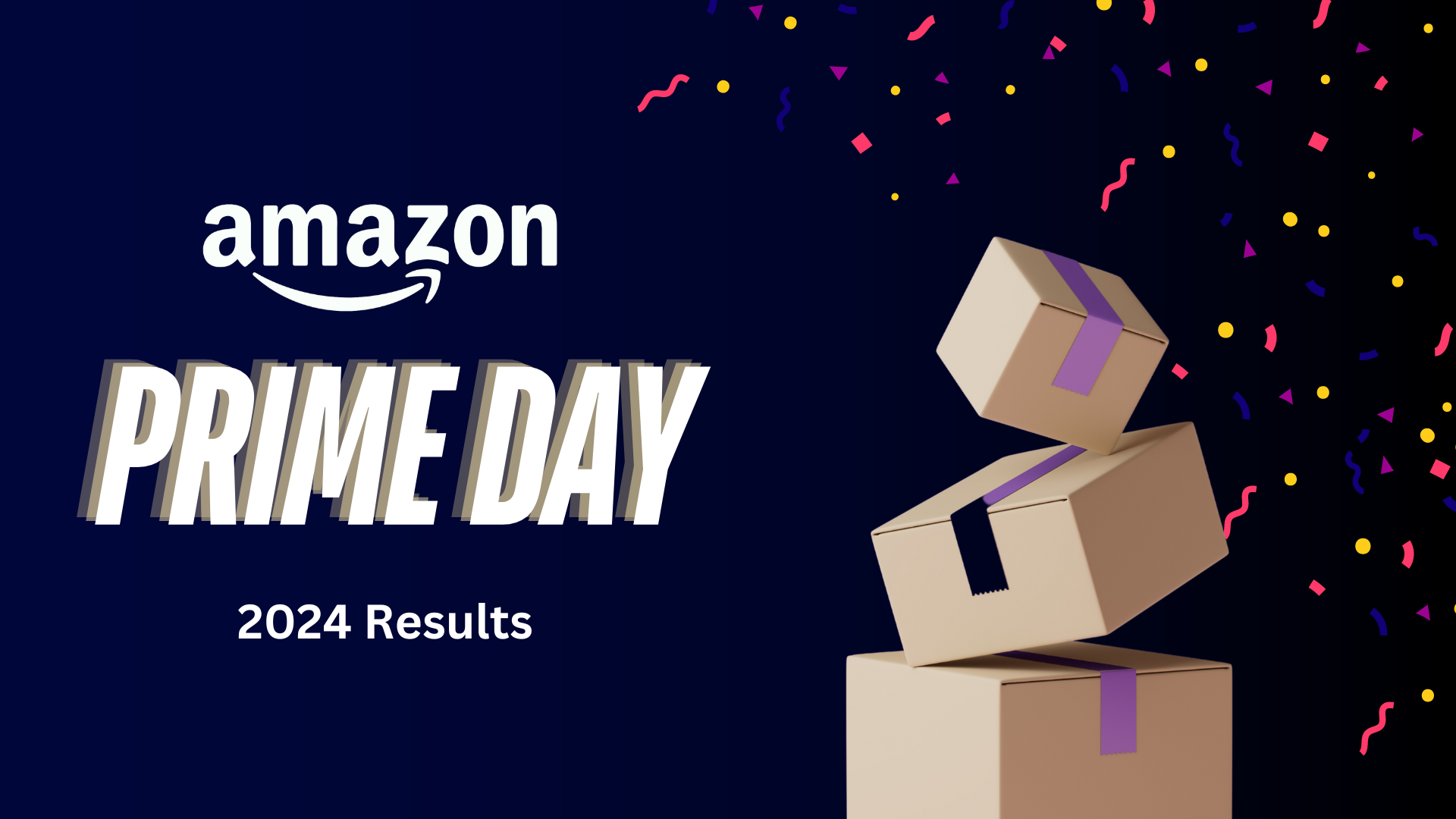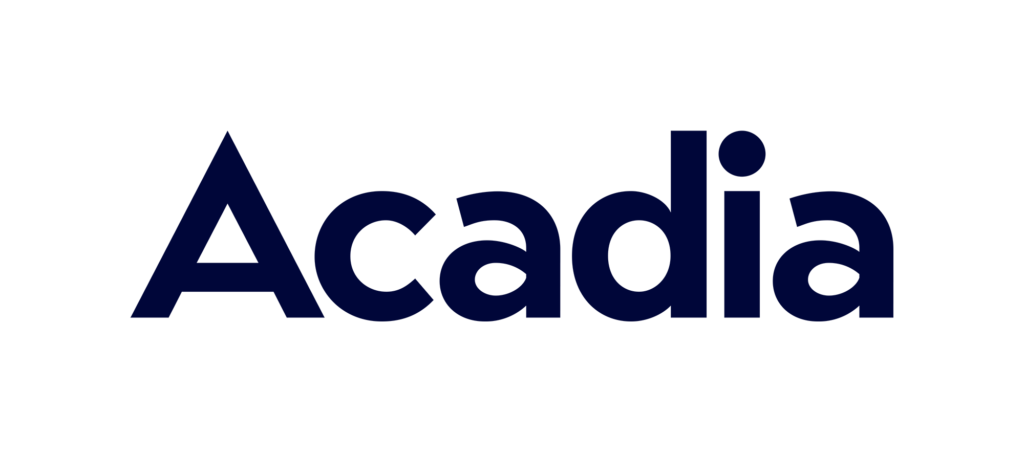The Search giant is currently in the process of rolling out a new SEO ranking signal that focuses on prioritizing people-first content in their search results. They are calling this update the “Helpful Content Update” (super helpful title). We’ve all been there. We clicked a link drenched in the promise of being precisely what we needed to read at the moment, whether for research or pleasure, only to be left with expectations that were unmet. Addressing this through algorithmic updates is an ever-evolving quest for Google, and the next chapter is now.
For any website with a strong SEO content strategy and SEO fundamentals, there should be nothing to worry about. For others with outdated SEO strategies and those who neglected to keep up with trends and best practices, there will be work to do. We believe this update will target mass AI written content, websites scraping information, websites using outdated spammy tactics, and irrelevant content that does not relate to the primary purpose of a website. The focus is on devaluing content specifically written for search engines and not written with a “people-first” approach.
The Crux of the Problem
Google is constantly updating its algorithm. That is no surprise, and they claim to make thousands of changes every year. That said, the majority of these updates are without notice, and Google provides little to no context on what changes they are making to the algorithm. When Google tells you there is an update and gives you the context behind it, it is important to listen.
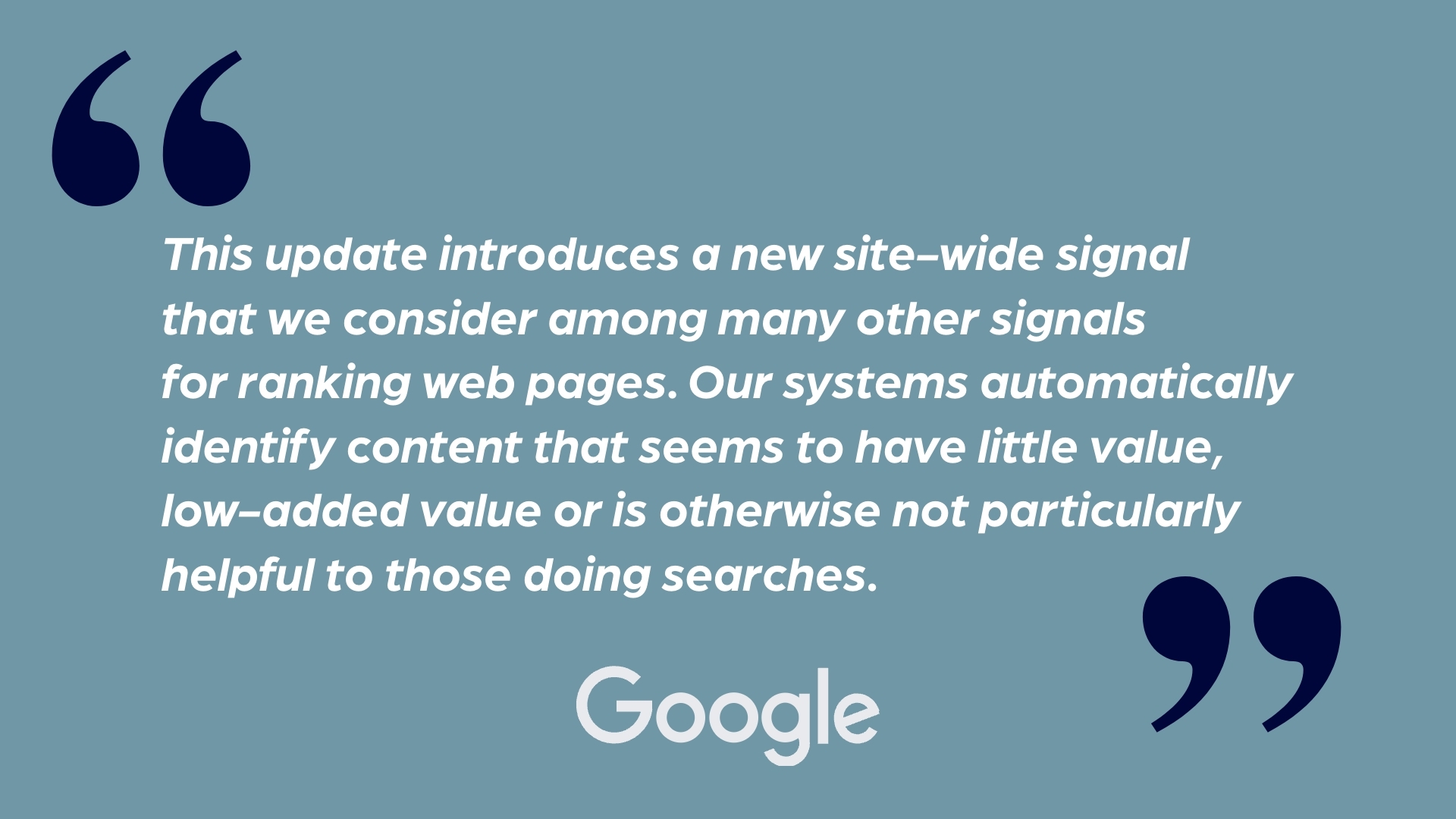
What We Know So Far
On August 18, Google announced the Helpful Content Update giving some context as to what it is, a checklist to go by, and what we can expect as far as timing and expectations. The update started rolling out Aug 25, 2022 and will take roughly 2 weeks. The information that Google provided says that the update will only apply to English searches at this time. This update will not be a manual action or a spam action but rather a new classifier that will be implemented through machine learning evaluation. Once a website is classified as having content that is “unhelpful,” it can affect even the good and well-performing content on a website. If hit with this classification, Google will re-evaluate your website after a certain period of time. This update parallels the Panda algorithm update in 2012 in that it focuses heavily on content quality, but time will tell as to how much of an impact it will have.
What People-First Content Should Be
The best way to avoid any negative performance in organic search from the Helpful Content Update is to have really good content. The content should be strategic and make sense for your business. Below are 4 critical factors when thinking through a content strategy with the hopes of it ranking well in organic search.
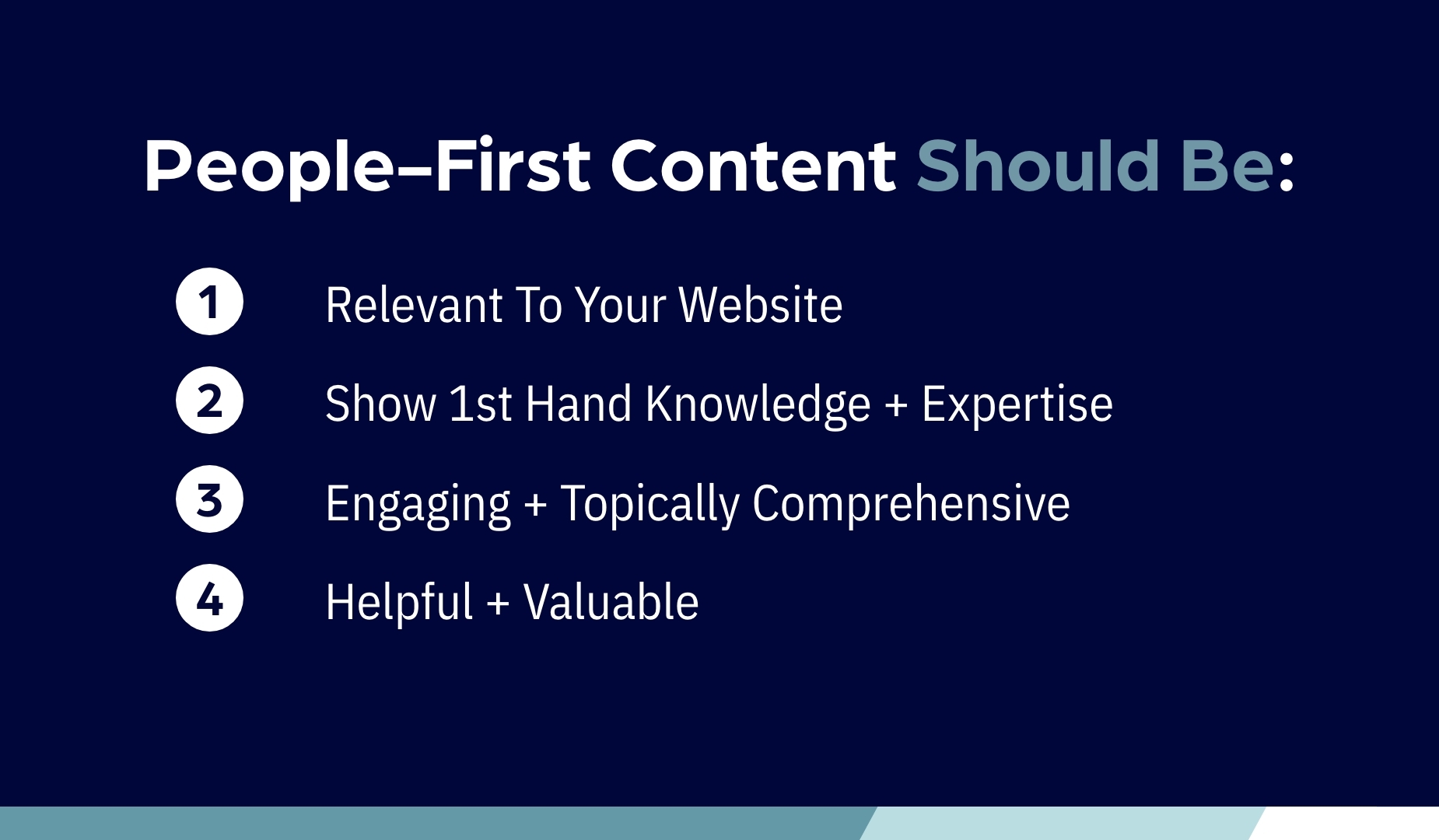
1. Relevant to Your Website
While this one seems like a no-brainer, there are websites that serve as content farms on the internet and do not have a strategic central theme or focus. Some of these are scrapers, and others have mass-generated content, whether AI or other, with a goal of building out a large keyword profile. From a business perspective, creating content aligned with your business should be the focus. This could be articles or landing pages that describe the differentiators of your product or service, white papers, or product and category content that helps provide more detail. From a keyword perspective, directly related content or very closely related tangential content is the best approach to drive qualified traffic to your website and develop a full-funnel keyword strategy.
2. Shows First-Hand Knowledge and Expertise
This is a really important one. We have seen Google move in this direction with Core Algorithm updates over the past few years, which have prioritized expertise, authority, and trustworthiness signals (E-A-T), and recently with a series of Product Review Updates. If you are a medical website, having information written or reviewed by a doctor is important. If you are providing reviews on a product, adding information that shows you have first-hand experience using that product is important. Incorporating expertise into your content will make it more credible and increase ranking signals for Google and other search engines.
3. Engaging and Topically Comprehensive
Is your content written well? Is it engaging enough to keep readers on your website and interested in your service? Are you including resources such as images to keep users engaged? Are you providing enough context to answer the searcher’s questions on a topic? All of these things are important for SEO, user engagement, and creating a good user experience on your website. Some of them will now also be additional ranking factors with this update.
4. Helpful and Valuable
Let’s not make things too complicated with this one. As the update indicates, ask the question, “is my content helpful, and does it add value?”. Are searchers’ questions answered? Are there any original insights, interpretations, or opinions from the content? Adding valuable content to your website with your company’s approach or differentiating opinions will help your content rank better in organic search engines.
What People-First Content Shouldn’t Be
While it is essential to focus on the dos, it is just as important to know what to avoid. This will be important when evaluating your existing and new content moving forward. Google provided a checklist of questions to use when evaluating your content, and we have bucketed these into 4 critical mistakes below.
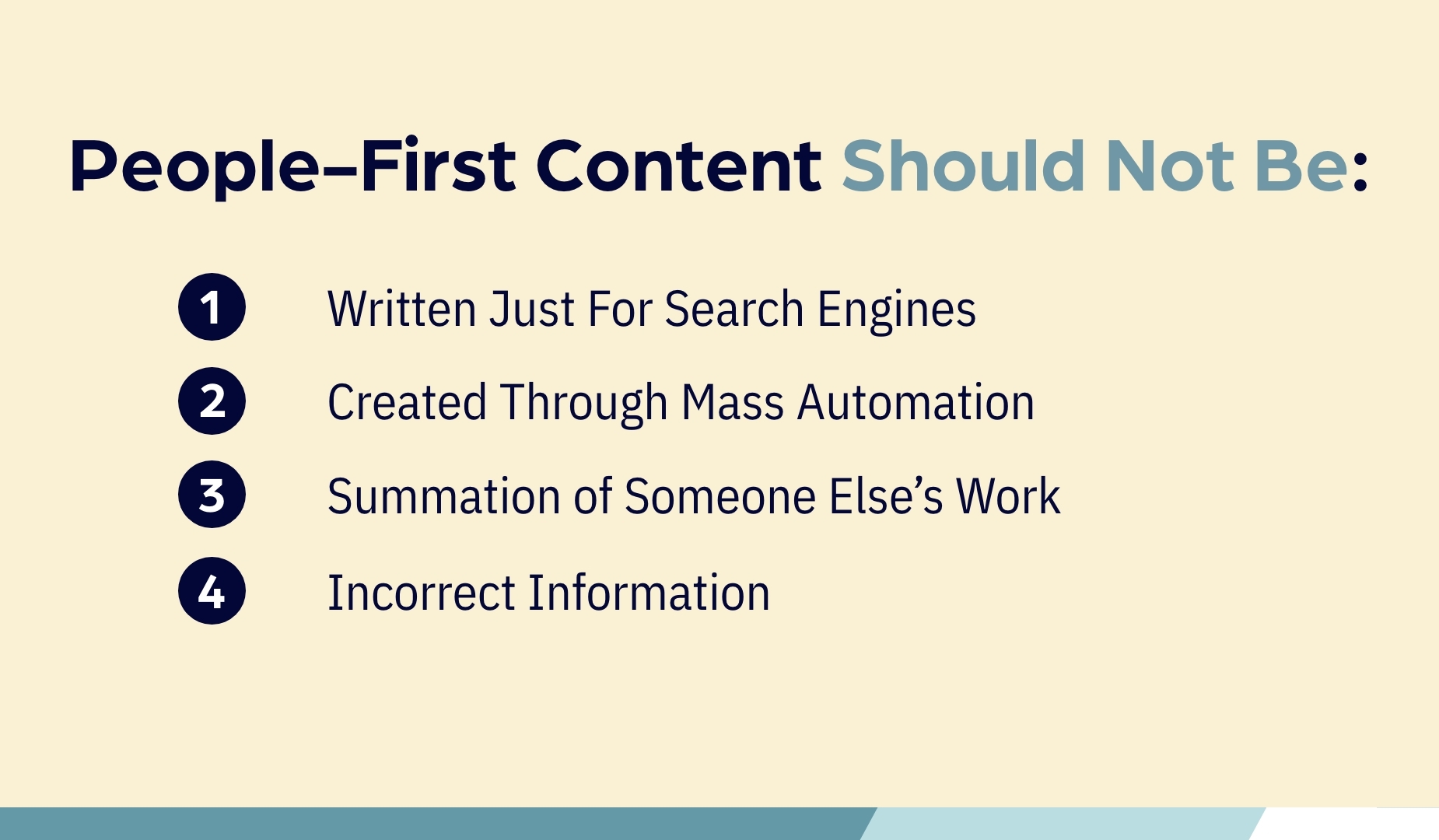
1. Written Just for Search Engines
You may be thinking to yourself, “wait a second… isn’t this guy’s job to get content ranking in search engines?” and you wouldn’t be wrong. However, we do not create content for search engines with that as the sole purpose. As performance marketers, our job is to drive qualified traffic that can convert. That means providing value and solutions to our client’s ideal customer. We want to answer the questions they haven’t asked yet. We want to engage them with information that they will find useful when they are in the commercial investigation process. This allows us to have a full-funnel keyword strategy, build brand awareness, and give more to customers than just an immediate sale. All content should be strategic and have the searcher in mind.
2. Created Through Mass Automation
I will confess that I have seen some fantastic AI-generated content. This technology has improved to a point where it can sometimes be hard to tell if the content was written by a human or a machine. That said, there is still always a lot of human legwork, research, and conjuring required to create quality content. When content automation is done at mass to cover a wide plethora of topics, Google could ding your website with the new algorithm. I recommend high-quality content, by high-quality copywriters, for high-quality results. Sometimes the longest path is taking the shortcut. Invest in content and parallel this with your SEO strategy.
3. Summation of Someone Else’s Work
The last thing the internet needs is more articles that say the exact same thing. It doesn’t help search results, doesn’t add value, and will not get great results on Google. Instead, the focus should be on adding a unique perspective, including original research, or applying a specific approach. This is what we recommend to all of our clients. Having helpful content that adds value and ranks well in search results is the ultimate goal.
4. Incorrect Information
Spreading misinformation and mayhem seems to be a hobby for some people. Don’t be one of these people. Google values correct information, and they are typically able to get a consensus from multiple sources of what information is accurate. Ensuring that all information is factual will help earn credibility and rankings in search engines. This should be prioritized in an effective SEO content strategy. In fact, Google specifically mentions that this can be impacted in the Helpful Content Update.
What to Do?
We are currently watching as Google’s algorithm rolls out to see who are the winners and losers of this algorithm update.
- Do not overreact if you see a decrease over the rollout timeframe. Ranking fluctuations can be expected as Google applies these updates, and sometimes decreases will correct themselves. If you have a solid SEO strategy and valuable content on your website, chances are that you will not see a decrease during this time. In fact, you may even see an increase. This is a site-wide algorithm update which means if you get hit, it will more than likely be to the entire website rather than a specific page.
- If you are hit with a decrease that doesn’t go away, it’s time to do a content audit. Does your content meet the criteria of the update? If there is content that is outdated, no longer relevant or does not add value, it may be best to retire the content altogether and redirect the existing URL to a more relevant page.
This doesn’t have to be a scary update, so go ahead and take a deep breath… *we all take a deep breath together* … see, isn’t that better? As I mentioned before, there is no need to panic. By following these suggestions, this can actually be an incredible opportunity to have valuable content and win in Search in the long term. If you are still concerned about the impact of Google’s Helpful Content Update, reach out to us at Acadia – this is what we do every day!
